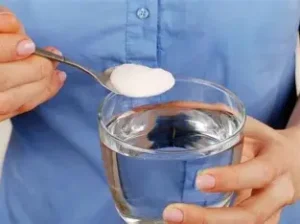Use Baking Soda for Urinary Problems—It Can Relieve Pain!
If you experience pain or burning during urination or a sense of heaviness in your bladder, you’re not alone. These symptoms often point to a urinary tract infection (UTI). A UTI is a common health problem that arises when microorganisms—typically bacteria that normally reside in our digestive tract—enter the urinary system and reach the bladder. Over 90 % of UTIs are caused by Escherichia coli . a bacterium naturally abundant in the intestines.

Women are particularly more susceptible to UTIs due to anatomical differences—a shorter urethra makes it easier for bacteria to travel from the bowel to the bladder. Typical symptoms of a urinary tract infection include:
- A burning sensation in the bladder area
- Pain or burning during urination
- Darkened urine, blood in the urine
- Fever, lower abdominal pain, discomfort or pressure in the pelvic area
If you experience these signs, it’s important to begin treatment promptly. Untreated infections can ascend from the bladder to the kidneys, potentially leading to more severe illness or complications.
Why Baking Soda (Sodium Bicarbonate)?
Baking soda, also known as sodium bicarbonate, is a widely available natural home remedy. It is known for its alkaline (basic) properties, which can help neutralize excess acidity. In the context of urinary tract infections, lowering urine acidity may make the environment less favorable for bacteria, potentially alleviating pain and irritation.
While baking soda does not kill bacteria like antibiotics do, many people use it to ease the burning sensation, reduce urinary discomfort, and temporarily calm bladder inflammation while medical treatment is underway.
How to Prepare and Use Baking Soda at Home
Recommended Preparation:
- Take about 200 ml (roughly 7 fl oz) of clean drinking water—room temperature is fine.
- Add one tablespoon of baking soda (approximately 12–15 grams).
- Stir thoroughly until fully dissolved.
- Drink the entire glass in one sitting, ideally in the morning on an empty stomach.
Dosage Tips:
- Do not use continuously for more than one week.
- Avoid overuse, as baking soda contains high sodium levels that may increase blood pressure or cause fluid retention.
- Do not use if advised to limit sodium intake due to conditions like hypertension, kidney disease, or heart failure.
How Baking Soda Helps
1. Alkalizing Effect on Urine
By neutralizing acidity, baking soda may reduce the irritation of inflamed bladder or urethral tissues, helping relieve burning sensations during urination.
2. Mild Anti-inflammatory Action
The alkaline environment can soothe irritation lining the bladder and urinary tract, offering temporary comfort.
3. Symptomatic Relief
While it doesn’t eradicate bacteria, it may relieve pain, burning, and the overall discomfort—making it easier to sleep and function until definitive treatment begins.
Comparisons with Conventional Treatments
- Antibiotics remain the gold standard for treating UTIs, as they target bacterial infection directly.
- Drinking plenty of fluids, especially water, helps flush bacteria from the urinary tract.
- Cranberry products, probiotics, and certain herbal supplements sometimes assist in prevention or mild symptomatic relief.
- Baking soda can be a useful supportive measure, but must not replace medical evaluation or antibiotics if an infection is suspected.
Precautions and When to See a Doctor
- If symptoms persist more than 24–48 hours, worsen, or are accompanied by high fever, back pain, or sweating at night, consult a healthcare professional.
- Those with chronic kidney disease, hypertension, heart disease, or on a sodium-restricted diet should avoid baking soda or seek medical advice first.
- Avoid prolonged use longer than one week; excessive use can lead to alkalosis, electrolyte imbalance, or worsen hypertension.
Detailed Usage Guide
Initial Phase (First 1–2 Days):
Prepare the mixture (one tablespoon soda in 200 ml water), drink once in the morning on an empty stomach.
- Monitor symptoms: if burning pain during urination decreases within hours, it may offer relief.
- Meanwhile, increase water intake throughout the day—minimum 1.5 to 2 liters.
If Symptoms Improve:
- Continue with one dose per day for up to 7 consecutive days, but no longer.
- Maintain urinary alkalinity by drinking water and possibly adding unsweetened cranberry juice for hydration and mild urinary tract support.
If Symptoms Persist or Worsen:
- Stop baking soda and seek medical consultation immediately.
- A doctor may recommend a urinalysis and antibiotic therapy based on results.
- Do not self-medicate with antibiotics.
Scientific Considerations
While baking soda is widely used in folk remedies, clinical studies supporting its effectiveness against UTIs are limited. Most evidence remains anecdotal. The buffering of urine pH may provide symptomatic comfort, but only proper medical treatment can eliminate the infection.
Doctors caution about risks such as:
- Systemic alkalosis if taken in high amounts or for prolonged periods
- Electrolyte imbalances (sodium, potassium)
- Potential interference with prescribed medications (such as lithium, certain antibiotics, heart medications)













